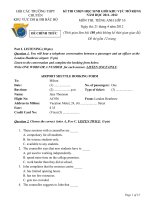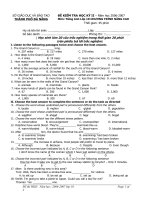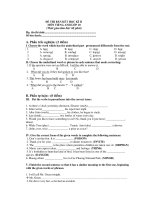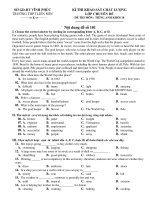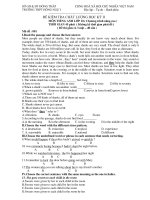TIẾNG ANH LỚP 10 ( BỔ ÍCH DỄ HIỂU )
Bạn đang xem bản rút gọn của tài liệu. Xem và tải ngay bản đầy đủ của tài liệu tại đây (136.48 KB, 14 trang )
TRƯỜNG THPT CHUYÊN HƯNG YÊN
ĐỀ THI ĐỀ XUẤT
KÌ THI CHỌN HỌC SINH GIỎI KHU VỰC MỞ RỘNG
NĂM HỌC 2013- 2014
MÔN THI: TIẾNG ANH LỚP 10
(Thời gian làm bài 180 phút không kể thời gian giao đề)
PART I: LISTENING (15 Points)
Section 1: You will hear a conversation between a senior librarian and a woman working at
the library. (5 points)
Questions 1-10
Questions 1-7: Choose the correct letter, A, B or C.
Example: The woman says she is interested in
A. part-time employment.
B. A permanent job.
C. Unpaid work.
1. The librarian says that training always includes
A. computer skills.
B. Basic medical skills.
C. Interpersonal skills.
2. All library service volunteers have to
A. record their arrival and departure.
B. Stay within ‘staff only’ sections.
C. Wear a uniform.
3. The woman would be entitled to a contribution towards the cost of
A. transport by minibus.
B. Parking at the library.
C. Public transport.
4. One recent library project involved
A. labeling historical objects.
B. Protecting historical photographs.
C. Cataloguing historical documents.
5. At present, the library is looking for people to
A. record books onto CD.
1
B. Tell stories to children.
C. read books to the blind.
6. The woman says she is interested in a project involving
A. taking library books to people in hospital.
B. delivering library books to people at home.
C. driving the disabled to the library.
7. The woman agrees to work for
A. two hours per week.
B. Four hours per week.
C. Six hours per week.
Questions 8 to 10: Choose THREE letters A-G
Which THREE of the following must be provided by all volunteers?
A. civil conviction check
B. signed copy of commitment
C. certificates to indicate qualifications
D. emergency contact information
E. date of birth
F. signature of parent or guardian
G. referees
Section 2: You will hear a plan of local radio programme about finding air pollution
solutions in Canadian towns. (10 points)
Questions 11-20
Questions 11-14: Complete the sentences below.
Write NO MORE THAN TWO WORDS AND/OR A NUMBER for each answer.
11. ‘Canadian Clean Air Day’ will be held on …………………….
12. Air pollution may be responsible for………………..deaths every year in Canada.
13. The sector most responsible for smog-producing pollutants is……………….
14. Scientists now know that even………………….of pollutants can be harmful.
Questions 15-20: Complete the notes below.
Write NO MORE THAN TWO WORDS AND/OR A NUMBER for each answer.
Reducing Air Pollution
2
Individual action
* respond to the (15) ‘………………….Challenge’
* walk, cycle or car-pool to work
* use public transit
* (16)……………………
* (17)……………………….your domestic equipment
Government action
* emission reduction in the (18)……………….region of US and Canada
* move towards (19)…………………………..(e.g. less sulphur in gasoline & diesel)
* reduction of pollutants from (20)……………….and power plants.
PART II. PHONETICS (5 points)
Question 1. Choose the word - A, B, C or D - that has its underlined part pronounced
differently from the other three in each question. (2.5 points)
1.
A. measure
B. leisure
C. ensure
D. pleasure
2.
A. expression
B. division
C. decision
D. television
3.
A. advance
B. advent
C. advice
D. adjustment
4. A. bury
B. cleanliness
C. plenty
D. dean
5. A. fever
B. example
C. ignore
D. ink
Question 2. Choose the word whose stress pattern is different from that of the others by
circling A, B, C, or D. (2.5 points)
6. A. initial
B. inherit
C. occurrence
D. occupied
7.A. obstacle
B. intolerable
C. possess
D. secure
8.A. technical
B. teardrop
C. treatable
D. horrific
9.A. apprentice
B. construct
C. perverse
D. papal
10.A. panel
B. label
C. realize
D. reality
PART III. LEXICO - GRAMMAR (30 points)
Question 1: Choose one of the words marked A, B, C, or D which best completes the
sentence. (5 points)
1.
You may be artistic, but I believe you are not cut.............. the job at the theta
A. down for
3
B. in for
C. down to
D. out for
2.
I knew he disagreed with my idea when I saw him...........
A. shake his head
3.
5.
B. will have been studied
C. is studying
D. would study
B. produce
D. take
B. did meet
C. were meeting
D. had met
C. be watered
D. being waters:
The plants need...........before noon.
B to water
The school required that every student........... before September 1st
B. registered
C. registers
D. was register
She resented.........waiting for hours in front of the cinema.
A. to be kept
10.
C. make
If only we...........a long time ago.
A. register
9.
D. bring
I like babysitting, although the children always................a mess.
A. watering
8.
C. have
A. will be studying
A. met
7.
B. give
Dora ....................... in university when you come back in three years' time.
A. do
6.
C. comb his hair D. stretch his arm
In your revision, you should ............ priority to tenses
A. take
4.
B. blink
B. keeping
C. being kept
D. being keeping
Doctors always hope that there will be new cures ................. some diseases.
A. to
11. Small
B. of
C. in
D. for
pox and diphtheria disappeared in Britain many years ago, cancer, AIDS and
..........heart disease are now predominant.
A. because
12. We
D. whereas
haven't seen .................... for ten years. I did wonder where you were.
A. one other
13.
B. in the event thatC. in case
B. each other
C. together
D. the others
In 1997, ................ the noise and pollution of the city, best-selling author Will Smith moved
out to Chersey.
A. tiring with
14.
B. to catch
C. to catching
D. than catching
I ................... three rooms of the house so far today; I'll do the other two this afternoon.
A. has been cleaning B. cleaned
4
C. being tired from D. tired of
I'd rather walk................a bus.
A. than catch
15.
B. tire about
C. are cleaning
D. have cleaned
16. Charlie
Chaplin was............. of the silent movies.
A. one of the great actor comics
B. the greatest comic actors
C. one of the greatest comic actors
D. a great comic actor one
17. Although
we do not live in the same town, my cousin and I still keep............... and often
speak on the phone.
A. up date
18.
B. in touch
C. in hand
D. off work
I am looking for a friendly young person to help.................. my elderly mother while I go out
to work during the day.
A. take after
19.
B. give care of
C. put up with
D. look after
.......... did you see such a good advertisement?
A. In which issue of which newspaper
B. In which newspaper of which issue
C. In which issue newspaper
D. What is the issue of which newspaper
20. .................
my personal qualities, I have experience of working in a multi-national company
for three years.
A. Beside
B. In addition
C. Instead of
D. Apart from
Question 2. Each line in the following passage contains one mistake (grammar or spelling).
Underline that mistake (IN LINE ORDER) and write your answer in the space provided.
(0) has been done for you as an example. (5 points)
Your answers
When we first took our children to sea with us, it was rare 0. across
to come cross other family on sailing boats. Usually such 1 ..........................
meetings resulted in the children quickly making friends, 2 ..........................
while we parents discuss how we managed. At firstly, I 3 ..........................
was worried about taking children to sea and I had many 4 ..........................
questions however I would amuse them? What if they fell 5 ..........................
ill at sea? Add to such questions was the major problem of 6 ..........................
their education. When we set out on our voyage, my 7 ..........................
duaghter was seven, my son five, and we planned to sail 8 ..........................
for three years. That we only returned to england six years 9 ..........................
late with 60,000 miles behind us and children of thirteen 10 ........................
and eleven years old, is an indicate of how my worries
5
had been answered. One change over these years has been
the increasing in the number of parents who take their
children to sea on long voyages.
Question 3. Fill in each blank with a suitable preposition. Write your answers in the space
provided. (5 points)
1. ______ a century ago, the English novelist wrote a book entitled “North and South”
2. The dividing line between north and south is a matter _______ opinion.
3. The divide goes well _______ mere prejudice.
4. In England, single people have much greater ease in moving _______ in search of work than
married people.
5. There are plenty of exceptions _______ this view in this country.
6. His shyness only added _______ his problems.
7. He would blush _______ the roots of his hair and mumble something quite silly.
8. The girl walked _______ clumsily, usually tripping over her own feet in the process.
9. The boy was tall _______ his age, and thin.
10. His Adam’s apple stuck _______ obstinately no matter how much how much he tried to hide
it.
Question 4. Supply the correct form of the verbs in bracket. Write your answer in the
space provided. Remember that sometimes you will have to change the order of the
adverb. (5 points)
I must tell you about our holiday this year it was one of the best we (ever have) 1. No, we
(stay)2 in an expensive hotel, but a youth hostel! I know what you (think) 3: we (must go)4. But
we haven’t I just wish we (discover)5 youth hostels years ago. Now that I’m back at
university again, luxury hotels (be)6 a thing of the past, and I (complain) 7 about this one day to a
friend who (say)8 that she and her family never stayed anywhere but hostels. I (have) 9 no idea
that hostels could be anything from a cottage to a castle. I (mean) 10 where else do you get to stay
in a castle! In fact there are four different grades simple, standard, superior and special so you
pay an overnight charge according to the kind of hostel you stay at.
Question 5. Give the correct form of the word in bracket to complete the passage. (5
points)
6
Your answers:
The __1__ (say) “never judge a book by its cover” could not 1. .........................................
be more true for Ridiculous Rules by Marjorie Allen. The
cover is completely blank, whereas the book is crammed full
of wonderful examples and anecdotes. Allen is an __2__ 2. .........................................
(speak) critic of what is taught to native and non-native
speakers of English, and has issued a __3__ (declare) of war 3. .........................................
against textbooks and style books which tell lies.
Take the ridiculous and __4__ (mean) rule of never 4...........................................
ending a sentence with a preposition. The lovely - if famous –
story goes, that Winston Churchill, well-known for his
numerous __5__ (write) as well as for being British Prime 5...........................................
Minister during the Second World War, received a manuscript
back from an ignorant __6__ (edit), who had told him rather 6. .........................................
rudely that he had to __7__ (phrase) a sentence which ended 7. .........................................
with a preposition. Churchill responded by making the simple
yet forceful __8__ (state) in the margin: “This is an 8. .........................................
impertinence up with which I will not put.” – the __9__ 9. .........................................
(imply) being that not to end a sentence with a preposition
often sounds ridiculous in English, Sadly, Allen informs us
that the story is probably mere __10__ (hear), and that 10. .......................................
Churchill may have actually only written “rubbish!” in the
margin.
Question 6: Choose the correct connectives for the gaps in the following passage. (5 points)
Our weather is not beautiful all the time. Perhaps you can remember a day (1)………bad
weather made you afraid. One kind of bad weather (2)……..scares many people is called a
thunderstorm. This is (3)………..happens when there is a thunderstorm. (4)………you see a
sudden flash of bright light. (5)…………a few seconds you hear a loud rumbling sound. This
quick flash is called lightning, (6)……….the loud sound is called thunder. Lightning is colorful;
(7)…….it can cause serious problems. Lightning is electricity (8)………is moving very rapidly.
7
It may be moving between a cloud and the ground, between two parts of the same cloud. The
lightning heats the air around it. This hot air expands, (9)…………gets bigger, and it causes the
air to move in waves. The air waves pass you in a series, one after another. (10)………you may
hear many rumbles and not just one sound.
1.
A. when
B. Which
C. that
D. what
2.
A. when
B. Who
C. that
D. what
3.
A. when
B. Whose
C. that
D. what
4.
A. First
B. Firstly
C. To begin
D. At the beginning
5.
A. within
B. without
C. with
D. Before
6.
A. but
B. and
C. or
D. furthermore
7.
A. furthermore
B. however
C. but
D. and
8.
A. when
B. Where
C. that
D. what
9.
A. but
B. however
C. or
D. moreover
10.
A. That’s why
B. The result
C. So
D. So that
PART IV: READING
Question 1. Read the passage below and choose the answer (A, B, C, or D) which best fits
each space. Write your answers in the space provided (including the letter A, B, C, or D).
(0) has been done as an example. (7.5 points)
The first traffic signal was (0) _____ by a railway signalling engineer. It was installed (1) _____
the House of Parliament in 1868. It (2) _____ like any railway signal of the time, and was
operated by gas. (3) _____, it exploded and killed a policeman, and the accident (4) _____
further development until cars became common.
(5) _____ traffic lights are an American invention. Red-green (6) _____ were installed in
Cleveland in 1914. Three-colour signals, operated (7) _____ hand from a lower in the (8) _____
of the street, were installed in New York in 1918. The (9) _____ light of this type to (10) _____
in Britain were in London, on the junction between St. James’s Street and Piccadilly in 1925.
Automatic signals were installed (11) _____ year later.
In the past, traffic lights were (12) _____. In New York, some lights had a statue on top. In Los
Angeles the lights did not just (13) _____ silently, but would ring bells to (14) _____ the
sleeping motorists of the 1930s. These are gone and have been (15) _____ by standard models
which are universally adopted.
8
1 A outside
B out
C out of
D outdoors
2 A resembled
B looked
C showed
D seemed
3 A However
B Therefore
C Although
D Despite
4 A forbade
B disappointed
C avoided
D discouraged
5 A New
B Recent
C Modern
D Late
6 A methods
B ways
C systems
D means
7 A by
B with
C through
D in
8 A middle
B heart
C focus
D halfway
9 A original
B primary
C first
D early
10 A show
B appear
C happen
D become
11 A a
B in the
C in a
D the
12 A various
B particular
C rare
D special
13 A change
B alter
C vary
D move
14 A rise
B raise
C wake
D get up
15 A reproduced
B replaced
C removed
D remained
Example: 0 A invented B created
C originated
D started
Question 2: Fill in each blank space with an appropriate word (7.5 points)
Travellers don’t have jobs, because (1) _______ don’t stay in one place long (2) _______.
They are the children of nature modern gypsies. When Autumn (3) _______, they disappear
and we don’t (4) _______ them on the news any (5) _______. In fact, they move to the cities
and look (6) _______ empty houses for the winter. Perhaps the children go to school for a (7)
_______ months.
Paul and Janice are travellers. They aren’t married. They have two children (8) _______
Moonstone and Saffron. Their life is (9) _______ simple. During the day they sit and talk to
their friends (10) _______ the children play. In the evenings they usually eat (11) _______ with
other families around a big fire, (12) _______ somebody usually plays a guitar or switches on a
CD player. They live (13) _______ social security benefits. If they need extra (14) _______,
Janice makes jewellery and sells it (15) ______ markets and fairs.
Question 3: Read the passage and mark the letter A, B, C or D on your answer sheet to
indicate the correct answer to each of the following questions. (5 points)
According to sociologists, there are several different ways in which a person may
9
become recognized as the leader of a social group in the United States. In the family,
traditional cultural patterns confer leadership on one or both of the parents. In other cases,
Line such as friendship groups, one or more persons may gradually emerge as leaders, although
(5)
there is no formal process of selection. In larger groups, leaders are usually chosen
formally through election or recruitment.
Although leaders are often thought to be people with unusual personal ability, decades
of research have failed to produce consistent evidence that there is any category of “natural
leaders.” It seems that there is no set of personal qualities that all leaders have in common;
(10)
rather, virtually any person may be recognized as a leader if the person has qualities that
meet the needs of that particular group.
Furthermore, although it is commonly supposed that social groups have a single leader,
research suggests that there are typically two different leadership roles that are held by
different individuals. Instrumental leadership is leadership that emphasizes the completion
(15)
of tasks by a social group. Group members look to instrumental leaders to “get things”
done.” Expressive leadership, on the other hand, is leadership that emphasizes the
collective well-being of a social group’s member. Expressive leader are less concerned
with the overall goals of the group than with providing emotional support to group
members and attempting to minimize tension and conflict among them. Group members
(20)
expect expressive leaders to maintain stable relationships within the group and provide
support to individual members.
Instrumental leaders are likely to have a rather secondary relationship to other group
members. They give orders and may discipline group members who inhibit attainment of
the group’s goals. Expressive leaders cultivate a more personal or primary relationship to
(25) others in the group. They offer sympathy when someone experiences difficulties or is
subjected to discipline, are quick to lighten a serious moment with humor ,and try to
resolve issues that threaten to divide the group. As the differences in these two roles
suggest, expressive leaders generally receive more personal affection from group members;
instrumental leaders, if they are successful in promoting group goals, may enjoy a mote
distant respect
1. What does the passage mainly discuss?
(A) The problems faced by leaders
10
(B) How leadership differs in small and large groups
(C) How social groups determine who will lead them
(D) The role of leaders in social groups
2. The passage mentions all of the following ways by which people can become leaders
EXCEPT
(A) recruitment
(B) formal election process
(C) specific leadership training
(D) traditional cultural patterns
3. In mentioning “natural leaders” in lines 8-9, the author is making the point that
(A) few people qualify as “natural leaders”
(B) there is no proof that “natural leaders” exist
(C) “natural leaders’ are easily accepted by the members of a social group
(D) “natural leaders” share a similar set of characteristics
4. Which of the following statements about leadership can be inferred from paragraph 2?
(A) A person who is an effective leader of a particular group may not be an effective leader
in another group.
(B) Few people succeed in sharing a leadership role with another person.
(C) A person can best learn how to be an effective leader by studying research on
leadership.
(D) Most people desire to be leaders but can produce little evidence of their qualifications.
5. The passage indicates that instrumental leaders generally focus on
(A) ensuring harmonious relationships (B) sharing responsibility with group members
(C) identifying new leaders
(D) achieving a goal
6. The word “collective” in line 17 is closest in meaning to
(A) necessary
(B) typical
(C) group
(D) particular
7. The word “them” in line 19 refers to
(A) expressive leaders
(B) goals of the group
(C) group members
(D) tension and conflict
8. A “secondary relationship” mentioned in line 22 between a leader and the members of a group
could best be characterized as
(A) distant
(B) enthusiastic
(C) unreliable
9. The word “resolve” in line 27 is closest in meaning to
11
(D) personal
(A) avoid repeating (B) talk about
(C) avoid thinking about (D) find a solution for
10. Paragraphs 3 and 4 organize the discussion of leadership primarily in term of
(A) examples that illustrate a problem
(B) cause and effect analysis
(C) narration of events
(D) comparison and contrast
Question 4: Read the passage then choose the best sentences A-K to fill in each gap. There
is one extra sentence which you do not need to use. (10 points)
BITTER WATER HITS THE BIG TIME
Chocolate, which has its origins in South America, is now part of a multi-million pound
worldwide business.
At Easter, British people spend over $230 million on chocolate. A massive eight per cent
of all chocolate is bought at this time.
(1)____. Although the large scale industrial production of chocolate began in the last
century, the cacao plant was first cultivated by the Aztec, Toltec and Mayan civilizations of
Central America over three thousand years ago.
The cacao tree is an evergreen, tropical plant which is found in Africa, South and Central
America, the West Indies and South East Asia. The fruit of this tree is melon-sized and contains
20-40 seeds. (2)____. In English – speaking countries, they are called cocoa beans. This is a
misspelling from the 17th century when they were also called cacoa and cocao beans.
The Aztecs used cocoa beans as money. (3)____. This is from the world in the Aztec
language, Nahuatl, meaning “bitter water”. (4)____. The Spanish found the drink more palatable
mixed with cinnamon and sugar, but the recipe did not spread to the rest of Europe for another
century. In the late 17th century, chocolate houses were set up in Europe’s capital cities, where
people gathered to drink chocolate.
(5)____. But in 1826, CJ van Houten of the Netherlands invented chocolate powder.
(6)____.
The age of the chocolate bar as we know it began in 1847 when a Bristol company, Fry
and Sons, combined cocoa butter with pure chocolate liquor and sugar to produce a solid block
that you could eat. (7)____.
At the turn of the century, the British chocolate market was dominated by French
companies. In 1879 the English company Cadbury even named their Birmingham factory
12
Bournville (ville is the French word for town) in the hope that a little glamour would rub off.
But then came Cadbury’s famous Dairy Milk bar which began life as a Dairymaid in 1905.
(8)____.
It seems that, for the time being at least, chocolate intake in Britain has established at
about four bars each week. (9)____. The latest market trick is the so-called “extended line”. This
is when the humble chocolate bar becomes an ice cream, a soft drink or a dessert, to tempt
chocoholics who have grown tired of conventional snacks.
At the other end of the production process, cacao farmers are still feeling the effects of a
crash in cocoa bean prices at the end of 1980s. (10)____. Perhaps you could spare a thought for
them as you munch your next chocolate bars.
A. This was made by extracting most of the cocoa butter from the crushed beans.
B. A Swiss company then introduced milk solids to the process which gave us milk chocolate.
C. They also used them to make a drink called xocoatl.
D. Until the last century, the chocolate drink was made from solid blocks of chocolate which
had to be melted down in hot water.
E. When dried they become cacao beans, which can be used to make chocolate.
F. Clever advertising which associated it with the healthy qualities of milk from the English
countryside quickly established the bar as a rival to the more decadent French brands.
G. British manufacturers include up to 5 per cent vegetable fat in their chocolate, something
forbidden elsewhere.
H. As most cacao farmers operate on a very small scale, many were forced out of business.
I. This has forced manufacturers to look for new ways to attract customers.
J. In Aztec times the chocolate drink was flavored with spices and used on ceremonial
occasions and for welcoming visitors.
K. Only at Christmas do people eat more of the cocoa-based foodstuffs.
PART V. WRITING: (20 points)
Question 1. Rewrite each of the following sentences in such a way that it has the same
meaning as the printed above sentence. (2.5 points)
1. What Anna hates most about these school reunions is posing for photographs.
-> There is nothing ........................................................................................................
13
2. Everything Long does seems to go wrong.
-> No ...........................................................................................................................
3. I firmly believe Lan to be telling the truth.
-> It was my .................................................................................................................
4. I am particularly looking forward to visiting Centre Point when I am in Sydney.
-> What ........................................................................................................................
5. The research cannot possibly be completed unless it is adequately funded.
-> Adequate ..................................................................................................................
Question 2. Rewrite the following sentences with the given words in such a way that the
second sentence has the same meaning as the first one. Do not change the form of the word
in brackets. (2.5 points)
1. The prisoner was recaptured as he crushed towards the gate. (dash)
.............................................................................................................................................
2. The incident ruined my chances of promotion. (paid)
.............................................................................................................................................
3. On my birthday I had only my cat for my company. (own)
.............................................................................................................................................
4. Jane and Peter had misunderstandings (cross)
.............................................................................................................................................
5. The manager told his staff that he was pleased but they could do better. (room)
.............................................................................................................................................
Question 3: Write a paragraph about the benefits of self-study. You should write about 150 to
200 words. (15 points)
THE END
14

